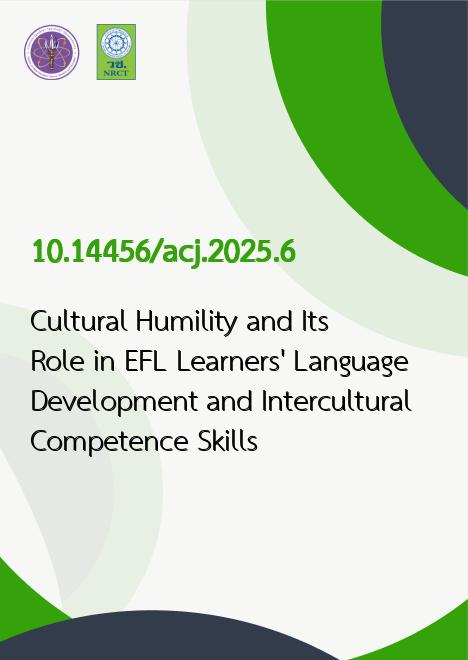
|
Cultural Humility and Its Role in EFL Learners' Language Development and Intercultural Competence Skills |
|---|---|
| รหัสดีโอไอ | |
| Creator | Hatsadin Samanchit |
| Title | Cultural Humility and Its Role in EFL Learners' Language Development and Intercultural Competence Skills |
| Contributor | Butsayamas Srinam, Ranchana Sakhonram, Supit Pongsiri, Chaleomkiet Yenphech |
| Publisher | The Office of Arts and Culture, Surindra Rajabhat University |
| Publication Year | 2568 |
| Journal Title | Arts and Culture Journal of the Lower Moon River |
| Journal Vol. | 14 |
| Journal No. | 1 |
| Page no. | 72-87 |
| Keyword | Cultural Humility, EFL Learners’ Intercultural Competence, Language Development |
| URL Website | https://so07.tci-thaijo.org/index.php/acj |
| Website title | วารสารศิลปะและวัฒนธรรมลุ่มแม่น้ำมูล |
| ISSN | ISSN 2822 - 0617 (Online);ISSN 2822 - 1141 (Print) |
| Abstract | The successful achievement of communication and significant interaction in various societies depends on cultural humility. This research investigated the essential role of cultural humility for students who learn English as their second language. The research highlighted its impact on language acquisition together with the development of intercultural competencies. The research involved third-year English program students at Buriram Rajabhat University who enrolled in the Intercultural Communication course through a mixed-methods approach that analyzed both survey data and semi-structured interview results. EFL students evaluated cultural humility as essential for acquiring their second language according to the study findings. The approach improved communication while increasing student confidence and leading to better adaptability when working with people from different cultural backgrounds. The qualitative data showed that combining practical exercises with theoretical instruction helped students develop their cultural understanding better. The research findings support the development of inclusive classroom environments which promote cultural humility and intercultural communication abilities. The research results demonstrate how teaching methods based on cultural awareness and responsiveness enhance the entire EFL learning quality. |